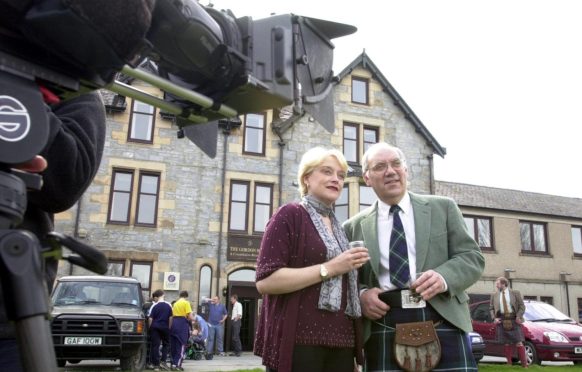
It was once slated to be the basis of a film starring A-list actors Liz Hurley and Gabriel Byrne, but the extraordinary case of the self-styled Laird of Tomintoul has largely faded from public conscience.
In the late-1980s, the arrival of Lord Tony Williams in the Grampian village, and with him millions of pounds’ worth of investment, changed residents’ lives.
Described by villagers as the “perfect gentleman”, he pumped money into property and businesses and his wealth and credentials were largely unquestioned. His aristocratic aura, coat of arms, and even a beer at the local brewery named in his honour, gave him a veneer of respectability.
But all was not as it seemed. In 1994, after eight years in the village, the façade came crashing down as police swarmed to seize evidence in a major fraud investigation.
The “laird” was, in fact, accountant Anthony Williams, who had bought his title at auction for £80,000 and was a white collar criminal who had embezzled at least £5.3 million of public money.
A former deputy finance director at Scotland Yard, across more than a decade he had siphoned off cash from a Metropolitan police fund set up for operational use.
The incredible story is one of the tales of scams and scandals investigated by criminologist Professor David Wilson in the latest series of Crime Files.
An incredible case
“The question, apart from how did it actually happen, is how did it disappear from view,” Wilson said. “Why do very few people know about this story?
“He was very good at living the lie. Apart from his manner, there was the way he dressed, and he had plausible explanations for where he got his money from – an uncle who had died in Norway. He genuinely had, albeit it was bought, a title.
“He invested a lot of money in the town and was employing 40 people, so there were careers being built up because of the frauds and there were a lot of people within the town who wanted him to succeed.
“This is about trying to correct the impression that’s evolved over time, whereby people thought he was stealing from the rich and giving to the poor.
“No, he was embezzling money from the public purse that had been set up to help fight the IRA mainland bombing campaign. This wasn’t Robin Hood. This was a fraudster.”
Williams was so trusted that he could make himself sole signatory on a large bank account and was able to simply write himself cheques with zero oversight.
Previously, he had been caught embezzling money from the Met’s social welfare fund, but managed to pass that off as a genuine accounting error.
Ironically, it wasn’t even his former colleagues who first cottoned on to the fact they were the victims of a scam – it was the Tomintoul branch of the Bank of Scotland that raised the alarm.
“This wasn’t just a Scottish story, it was very much a national story in terms of the United Kingdom,” Wilson said. “It’s interesting who will pick up on me talking about it, because there are still questions the Met should be answering about how Williams got away with it for so long and what impact that might, or might not, have had in relation to the IRA’s bombing campaign in the south-east of England.”
Wilson believes that Williams turned to embezzlement after leaving his first wife and children and moving in with a new partner. Juggling the costs of two homes and two families, and having had a taste for the high life, there was no desire to stop.
“I think he learned a lot from the first embezzlement – he realised how to do it slightly better. He realised he could take more and more money. I think he did it primarily because he was under financial pressure and then he wanted to live that lifestyle. He wanted to be the Laird of Tomintoul.
“His fraud lasted for eight years, which is a very long period of time. That was also intriguing to me – by the end, did he believe he really was the laird?
“If you get away with it for a certain length of time you have to live the lie. The longer you do, the more it appears authentic, not just to other people, but then subtly, psychologically, to yourself.”
Wilson remains keen to track down Williams, if he is still alive, in a bid to further pursue the story.
He was last heard of being freed from jail in 1999, and working as a bus driver as part of a prison-release scheme.
“The story disappears very quickly from public consciousness and we’ve been the first to almost bring it back,” Wilson said.
“It would have been much more difficult to get away with that kind of fraud today. Back then, you couldn’t look him up on Google and get his back-story.
“It’s fascinating. And is there more to uncover? For me, the story hasn’t ended.”
White collar crime
The tale of Williams and the issue of white-collar crime is part of the fourth series of Wilson’s popular series, Crime Files, which this time around centres around scams and scandals.
He was keen to focus on crimes that impact people every day, and that continually get more sophisticated as technology advances.
“I know everybody gets fascinated when I talk about murder or violent crimes but, thank God, they’re still a relatively rare occurrence,” he said. “More common are people being caught up in scams and scandals. That’s why I wanted to have this series deal with those kinds of issues.
“We want to make people aware they can be vulnerable, from romance frauds to cryptocurrency scams, to the impact of social influencers. There’s a whole range of things that people might fall for.”
David Wilson’s Crime Files airs weekly on BBC Scotland on Tuesday at 10pm. All episodes are available to view on iPlayer.

Enjoy the convenience of having The Sunday Post delivered as a digital ePaper straight to your smartphone, tablet or computer.
Subscribe for only £5.49 a month and enjoy all the benefits of the printed paper as a digital replica.
Subscribe © Supplied
© Supplied